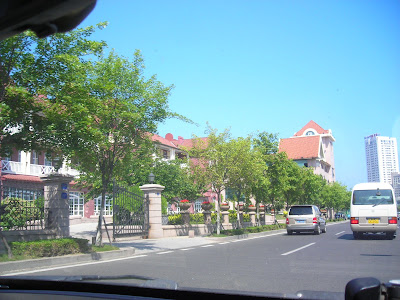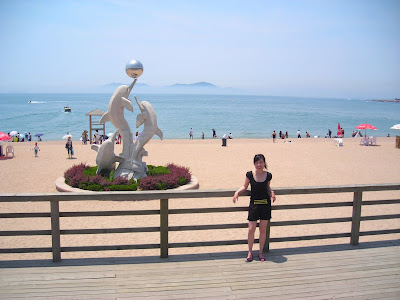Fellow travelers, if you are ever in China do not overlook the city of Qingdao. The hype of China's larger cities or more historical sights of temples and tombs may sometimes dominate the foreign perspective. However, Qingdao is a place removed from the hustle of urbanity yet lifted from substandard living conditions that can plague many quieter destinations. It is actually one of China's cleanest and most laid-back cities. Additionally, it has its own eclectic presentation of historical sights.


Qingdao used to be spelled Tsingtao and has China's largest brewery for Tsingtao beer which was established by the Germans in 1903. Before the Germans were ousted by the Japanese, they built a impressive amount of European style buildings. The most famous is probably Ying Binguan or the Guest House which was originally the German governor's home and then afterward served to host many dignitaries like Mao Ze Dong. However, although it looks European--a closer inspection will reveal it's Chinese undertones.
For example, I was amused by these hideous fluorescent bulbs retrofitted on to this antique chandelier.
Also, the Chinese features in this art piece is a good example of Christianity emerging in China. Could she be a Chinese Virgin Mary of sorts?
What a lovely view from the balcony! It even looks slightly Mediterranean.
The nightlife in Qingdao is very western and dominated by American and Korean hip-hop. In fact, Qingdao has one of China's largest Korean populations, second to Beijing. My favorite place out of three is called Club 88 which is located in the bar district
xiang gang hua yuan, translated as Hong Kong Garden. For some reason they were strict with pictures, but I snapped a few anyways. The interiors are old-world eclectic with giant chandeliers that parade across the ceiling and wood paneling on the walls and in the bathrooms. Although the toilets are the squatting kind, a bathroom attendant keeps the facility clean and presentable---a minor accomplishment in China.
A DJ booth is set-up behind the bar where props like type-writers and Tiffany lamps finish off the atmosphere.
It's common to have live entertainment in most night venues so stages were setup in the middle and front of the place. Performers will do covers of other artists as well as introduce their own songs. Lady Gaga's music is extremely popular at the moment as is the Korean pop group, Wonder Girls. Check out their "
Nobody But You" video; it is totally inspired by the movie Dream Girls.
Around the corner at Feeling Bar the crowd is ruined by sweaty old men. Go for the giant trampoline inset within the dance floor that assists Chinese people with no rhythm to bounce in unison with the music. Avoid buying bottles, not only because its expensive ( you do get a Russian import after all) but because the mixers you get with your vodka is a rip-off. I would expect at least a better disguise of their vending machine bottles and cans. Stick with Tsingtao in Qingdao.
I liked the graffiti on the street that leads to our hostel. (Pardon the blurry picture. I will blame it on my camera's slow shutter speed but after a night out it could also be something else)
In the morning, we noticed the stenciling looked to be of the British graffiti artist, Banksy. Banksy is famous for unique spin on street art by incorporating realism with cheeky social commentary. Read more about him on webUrbanist
here and check out his gallery
here. It would be amazing if he had also passed through these parts and left his mark.
I was really impressed with Qingdao. I knew there would be beer and beaches, but I did not expect the interesting fusion and influence of culture that culminated in that city. Our primary reason for visiting Qingdao was to visit the other teachers teaching in the area. I got so much more than I was looking for with the city's pop culture and laid-back atmosphere. See the following posts for what else happened that weekend including of course beer and beaches.
















































